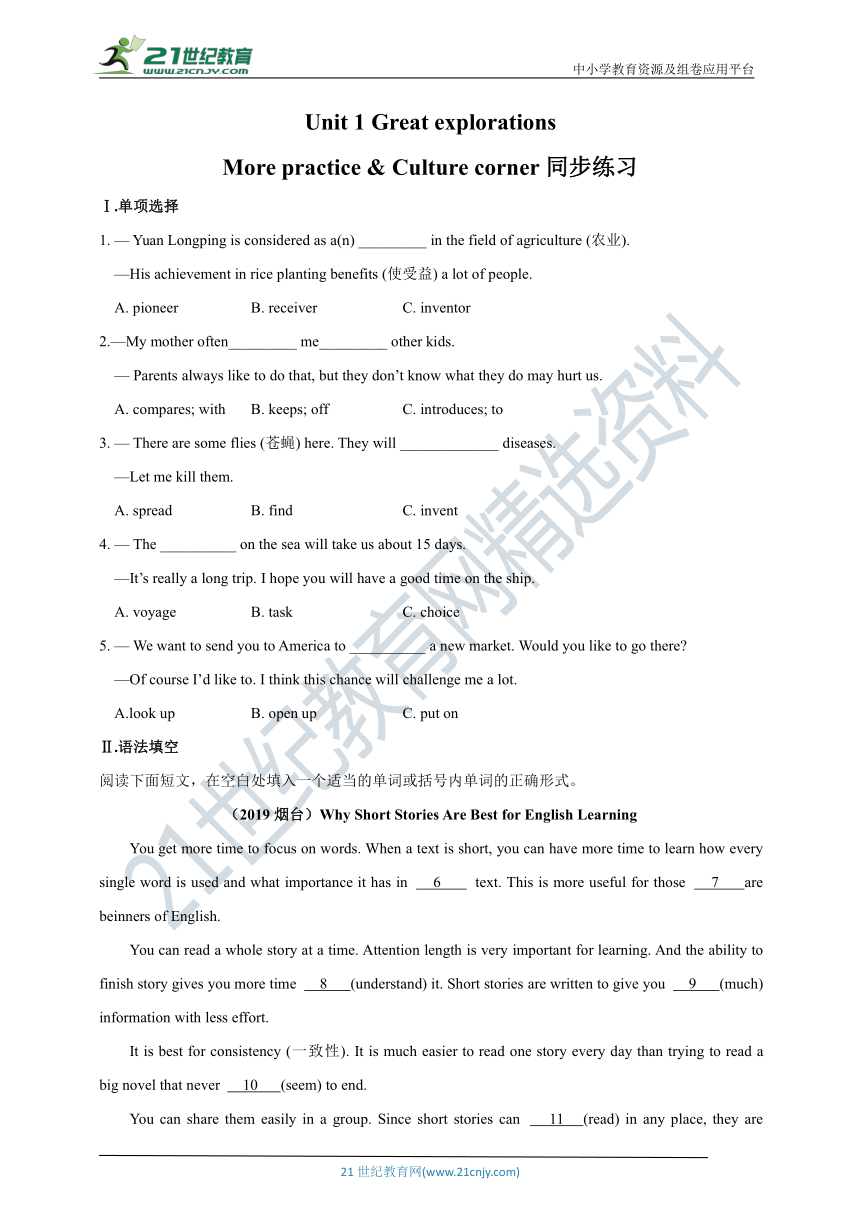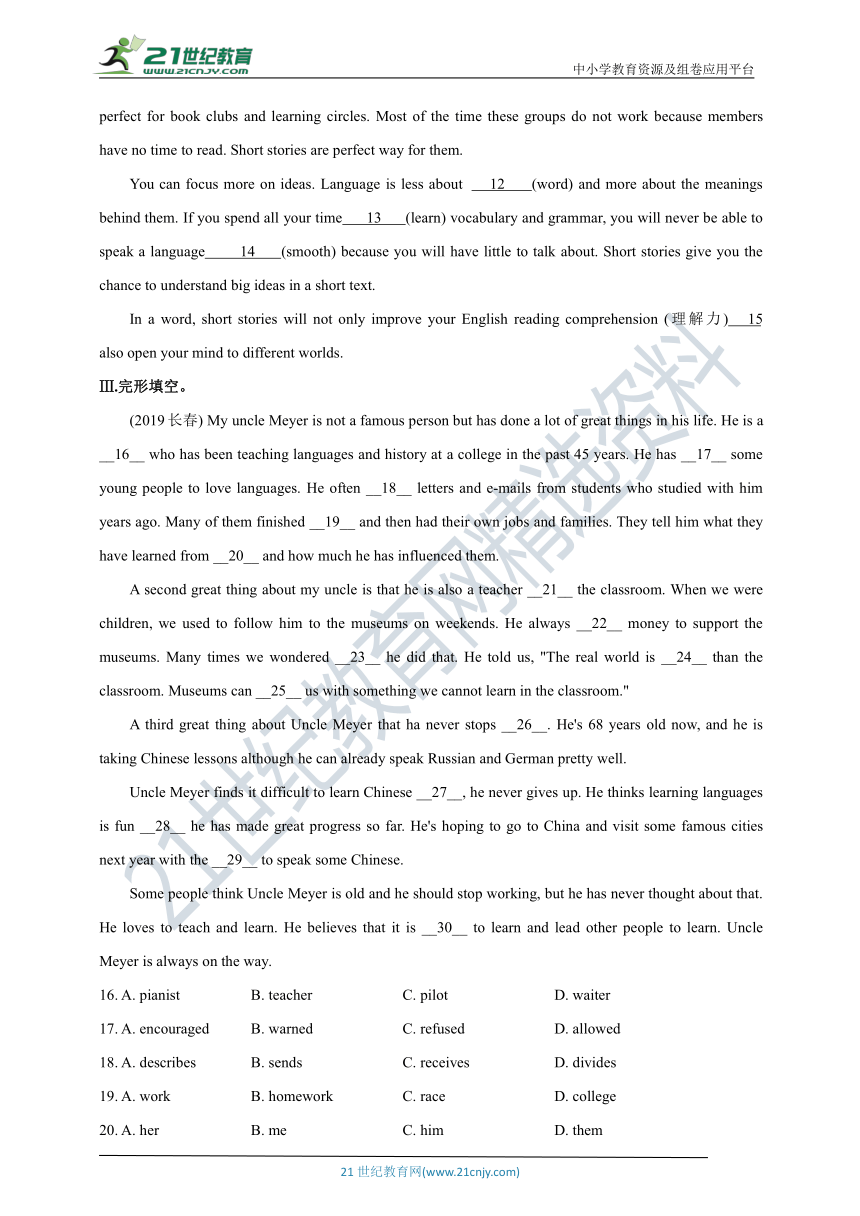Unit 1 Great explorations 第4课时More practice and culture corner同步练习
文档属性
| 名称 | Unit 1 Great explorations 第4课时More practice and culture corner同步练习 |  | |
| 格式 | zip | ||
| 文件大小 | 1.1MB | ||
| 资源类型 | 试卷 | ||
| 版本资源 | 牛津深圳版 | ||
| 科目 | 英语 | ||
| 更新时间 | 2019-12-06 16:57:34 | ||
图片预览


文档简介
中小学教育资源及组卷应用平台
Unit 1 Great explorations
More practice & Culture corner同步练习
Ⅰ.单项选择
1. — Yuan Longping is considered as a(n) _________ in the field of agriculture (农业).
—His achievement in rice planting benefits (使受益) a lot of people.
A. pioneer B. receiver C. inventor
2.—My mother often_________ me_________ other kids.
— Parents always like to do that, but they don’t know what they do may hurt us.
A. compares; with B. keeps; off C. introduces; to
3. — There are some flies (苍蝇) here. They will _____________ diseases.
—Let me kill them.
A. spread B. find C. invent
4. — The __________ on the sea will take us about 15 days.
—It’s really a long trip. I hope you will have a good time on the ship.
A. voyage B. task C. choice
5. — We want to send you to America to __________ a new market. Would you like to go there?
—Of course I’d like to. I think this chance will challenge me a lot.
A.look up B. open up C. put on
Ⅱ.语法填空
阅读下面短文,在空白处填入一个适当的单词或括号内单词的正确形式。
(2019烟台)Why Short Stories Are Best for English Learning
You get more time to focus on words. When a text is short, you can have more time to learn how every single word is used and what importance it has in 6 text. This is more useful for those 7 are beinners of English.
You can read a whole story at a time. Attention length is very important for learning. And the ability to finish story gives you more time 8 (understand) it. Short stories are written to give you 9 (much) information with less effort.
It is best for consistency (一致性). It is much easier to read one story every day than trying to read a big novel that never 10 (seem) to end.
You can share them easily in a group. Since short stories can 11 (read) in any place, they are perfect for book clubs and learning circles. Most of the time these groups do not work because members have no time to read. Short stories are perfect way for them.
You can focus more on ideas. Language is less about 12 (word) and more about the meanings behind them. If you spend all your time 13 (learn) vocabulary and grammar, you will never be able to speak a language 14 (smooth) because you will have little to talk about. Short stories give you the chance to understand big ideas in a short text.
In a word, short stories will not only improve your English reading comprehension (理解力) 15 also open your mind to different worlds.
Ⅲ.完形填空。
(2019长春) My uncle Meyer is not a famous person but has done a lot of great things in his life. He is a __16__ who has been teaching languages and history at a college in the past 45 years. He has __17__ some young people to love languages. He often __18__ letters and e-mails from students who studied with him years ago. Many of them finished __19__ and then had their own jobs and families. They tell him what they have learned from __20__ and how much he has influenced them.
A second great thing about my uncle is that he is also a teacher __21__ the classroom. When we were children, we used to follow him to the museums on weekends. He always __22__ money to support the museums. Many times we wondered __23__ he did that. He told us, "The real world is __24__ than the classroom. Museums can __25__ us with something we cannot learn in the classroom."
A third great thing about Uncle Meyer that ha never stops __26__. He's 68 years old now, and he is taking Chinese lessons although he can already speak Russian and German pretty well.
Uncle Meyer finds it difficult to learn Chinese __27__, he never gives up. He thinks learning languages is fun __28__ he has made great progress so far. He's hoping to go to China and visit some famous cities next year with the __29__ to speak some Chinese.
Some people think Uncle Meyer is old and he should stop working, but he has never thought about that. He loves to teach and learn. He believes that it is __30__ to learn and lead other people to learn. Uncle Meyer is always on the way.
16. A. pianist B. teacher C. pilot D. waiter
17. A. encouraged B. warned C. refused D. allowed
18. A. describes B. sends C. receives D. divides
19. A. work B. homework C. race D. college
20. A. her B. me C. him D. them
21. A. on B. inside C. at D. outside
22. A. checked out B. gave away C. picked up D. turned down
23. A. why B. how C. when D. where
24. A. thinner B. smaller C. shorter D. bigger
25. A. solve B. stop C. provide D. discover
26. A. exercising B. sharing C. learning D. writing
27. A. However B. Again C. Besides D. Also
28. A. or B. and C. but D. till
29. A. time B. money C. ability D. story
30. A. unfair B. boring C. polite D. meaningful
Ⅳ.阅读理解
(2019宜宾)“I will learn Chinese!” This idea jumped into my head. It was born of something deeper inside. The idea has changed my life completely. When other people asked me why, I often joked that I was inspired by the nice tank of goldfish in the Chinese restaurant my family frequented(频繁光顾) when I was young. In fact, I started studying it because I was always attracted to Chinese culture, and learning the language is the key to achieving my dream of travelling around China.
I was lucky for many reasons. Back in 2010, Chinese was not as popular with foreigners as it is today. However, my family lent me strong support from my first year abroad in China. Even if they cannot see me often and miss me so much, I still have their support. I was also very fortunate that a Confucious Institute opened. I will always thank for its excellent staff and all the great people I met there.
Ni hao! The word “hello” in Chinese was the first word I learned in my first Chinese class. After class I was filled with enthusiasm and couldn’t stop thinking about “ni hao” and all the new words yet to come. Not only were many more words and phrases waiting, but also the experiences I never expected.
31.What caused the writer to study Chinese?
A.His sudden idea.
B.His interest in Chinese culture.
C.His family’s influence on him.
D.Chinese restaurant’s goldfish tank.
32.The writer’s dream is to _____.
A.learn the Chinese language
B.change his life completely
C.open a Chinese restaurant
D.travel around China
33.What is paragraph 2 mainly about?
A.The support which he has got.
B.The reason for his study in China.
C.The advantages of his Chinese learning.
D.The difficulty he has in Studying Chinese.
34.How did the writer feel about his first Chinese class?
A.Satisfied. B.Disappointed. C.Excited. D.Worried.
答案
Ⅰ. 1-5 AAAAB
Ⅱ. 6. the 7 who 8. to understand 9 more 10.seems
11. be read 12. words 13.learning 14.smoothly 15. but
Ⅲ.16-20 BACDC 21-25 DBADC 26-30 CABCD
Ⅳ.31-34 BDAC
21世纪教育网 www.21cnjy.com 精品试卷·第 2 页 (共 2 页)
HYPERLINK "http://21世纪教育网(www.21cnjy.com)
" 21世纪教育网(www.21cnjy.com)
